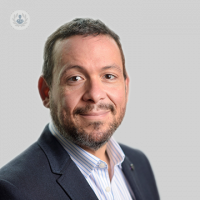Guide to easy shoulder surgery recovery
Written by:In his latest online article, Mr Nick Ferran gives us his insights into shoulder surgery recovery. Following awake shoulder surgery or a regional nerve block, minimising post-operative pain is crucial for a comfortable recovery. Typically lasting up to 24 hours, the nerve blocks are complemented by prescribed tablet painkillers for continued relief after discharge.

Pain management:
For effective pain relief, it is recommended to take prescribed painkillers before bedtime on the first night after surgery and again the next morning. This gradual approach ensures a smooth transition as the nerve block wears off. However, caution is advised against using anti-inflammatory drugs if the surgery was for a shoulder or clavicle fracture due to their potential impact on healing.
Enhanced relief strategies:
To further alleviate discomfort, applying an ice pack to the shoulder can be beneficial. Sessions of icing, limited to 20 minutes each, can be repeated as needed.
Sleeping comfortably:
Given the typical post-surgery discomfort, sleeping directly on the operated shoulder may be challenging. Instead, lying flat on your back is recommended, with a strategically placed pillow providing support for the operated shoulder and arm, facilitating a more comfortable sleep.
Shoulder sling management:
Patients undergoing keyhole surgery are often provided with a temporary shoulder sling, which supports the arm during the initial recovery period. Following instructions from the medical team, this sling can be discarded the next morning as exercises for the shoulder, elbow, wrist, and hand commence. For specific surgeries, such as rotator cuff repair or shoulder stabilisation, a more extended use of a poly-sling may be necessary, with guidelines provided post-operation.
Rehabilitation guidance:
Post-operative rehabilitation varies based on the specific shoulder surgery. The anticipated rehabilitation plan discussed pre-surgery is reiterated after the procedure. Almost all patients will require post-operative physiotherapy, necessitating coordination for timely initiation and approval from the insurance company.
Showering and wound care:
After shoulder surgery, the wound is initially stitched, secured with steri-strips, and covered with a dry dressing. While the outer pressure dressing is typically removed before leaving the hospital, the inner dressing should remain clean and dry for two weeks. Showering is advised only after suture removal, with sponge baths recommended until that time to maintain cleanliness.
Resuming driving:
Driving with a shoulder sling or dressing is unsafe and could invalidate insurance. Once permission to remove the sling is granted, it is advisable to wait about two weeks before resuming driving due to residual pain and stiffness.
Adhering to these guidelines ensures a smoother recovery journey after shoulder surgery, optimising pain management, sleep, rehabilitation, and daily activities. Always follow the specific instructions provided by your healthcare team for a successful and comfortable recovery process.
Mr Nick Ferran is an esteemed orthopaedic surgeon with over 20 years of experience. You can schedule an appointment with Mr Ferran on his Top Doctors profile.


